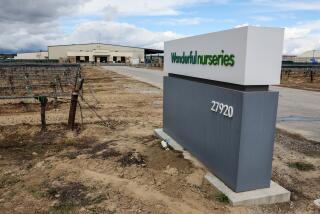Bring farmworkers’ plight into the sunlight
FRESNO — It was around 2 o’clock, temperatures rising under an arcing sun, when I met two workers on a peach farm near here recently.
One had first entered the country illegally nearly 40 years ago but later became a U.S. citizen at a time when the process wasn’t so difficult and politicized. He became a foreman, and he and his wife raised three children who went to California universities and got good jobs.
The second worker, who was thinning peach trees, is here illegally from Mexico. He sends money home to a family he can’t visit because it’s too difficult and expensive to cross the border. He shares a cottage with four other farm laborers and lives in fear of arrest and deportation.
I met the owner of the farm, too, and he’s worried sick that a possible labor shortage in September will leave him unable to harvest grapes for raisins. He’s not alone. Lots of growers in California fear that this could be the year when they take a hit because they can’t find enough hired hands, due in part to tightened border security. And if that happens, don’t be surprised if their losses translate into higher prices for you at the supermarket.
Do the nation’s immigration laws work for anyone?
Not particularly, and they don’t even make any sense. On paper, you can’t enter this country illegally, but once you do, you can open a bank account and send your children to school.
Yet reform proposals never get anywhere, even though many polls have suggested a majority of Americans — including Republicans — would support more work visas and strict border enforcement along with gradual legal status for those who meet certain criteria and pay dues for being in the country illegally.
As I said in Sunday’s column, an Irvine-based farm trade group called Western Growers is begging for some help — if not comprehensive immigration reform, then at least a guest-worker program — to ward off a feared labor shortage and give protection to workers they readily admit are undocumented. But even though Western Growers leans conservative and is headed by a former Reagan administration official, it’s being snubbed by the GOP politicians it helped get elected.
Boo-hoo is the response from some California farm watchers, who accuse Big Ag of trying to nail down a steady flow of exploitable labor and thereby hold down wages. Already, some growers are complaining about competitors hiking wages by as little as 25 cents an hour in some cases, a bidding war they’d rather not enter.
To others, reality is more complicated and immigration laws need tweaking if not overhauling. A guest-worker program known as H-2A is already in place, but California growers claim it’s cumbersome and involves delays that don’t work for their types of crops.
“H-2A works in many states, but it does not work in California” except in limited cases, said U.S. Sen. Dianne Feinstein (D-California), who hopes to feature ag jobs as part of an immigration reform bill she is promoting next year.
“We will have a bill. How far that bill gets, I can’t say.”
If the growers get tired of waiting, they do have options, said Don Villarejo. When wages go up, work shortages can magically disappear, said the former director of the California Institute for Rural Studies. He’s in favor of ending the grand deception and offering some legal status to the legions of undocumented workers now keeping the industry afloat, as well as bringing in a limited number of additional workers each year on work visas of some type.
But if the guaranteed bottom wage was $10 an hour, with some health benefits offered and working conditions regulated, that would be more fair to existing workers and also attract unemployed U.S. citizens who have shown no interest in farm work, Villarejo said.
“People in the industry would say they can’t afford more. Well, I’m not so sure,” said Villarejo, who told me some large growers are now covering access to health clinics. If smaller growers can’t afford to do that on their own, he suggested they form consortia. “When you look … at net income for specialty fruits, nuts, vegetables and so forth, these [growers] are doing pretty well. And I hear strawberries are a $2-billion crop.”
Eliseo Medina, a former farmworker who later teamed with Cesar Chavez in the United Farm Workers, agreed that fair compensation and protection against abuse would be a good starting point. As for immigration reform and/or a guest-worker program, he was more firm. With polls indicating majority support for changes, he said, he’s had it with Republican politicians standing in the way of public will. And if the growers had any horse sense, so to speak, they’d let those GOP officials know the cost of inaction.
“But they don’t go in and say to the Republicans, ‘Look, you’re not going to get any more support from us. You’re not going to get any votes from us,’” said Medina, who’s now a top-ranking SEIU official.
I think that’s good advice from Medina, and I pass it on respectfully to the growers, along with a few more suggestions.
If they want to end the lies and hypocrisy that define immigration policy, bring their employees out of the shadows and improve their lot. They ought to begin telling the story of those workers’ risks, sacrifices and contributions. As the growers know, they have no more valuable asset than the sweat and calluses of their crews. And rather than slip quietly into Washington next time, as they did recently on another unsuccessful lobbying mission, they should grab their pitchforks, fire up the tractors and take the town by convoy.
More to Read
Start your day right
Sign up for Essential California for news, features and recommendations from the L.A. Times and beyond in your inbox six days a week.
You may occasionally receive promotional content from the Los Angeles Times.







